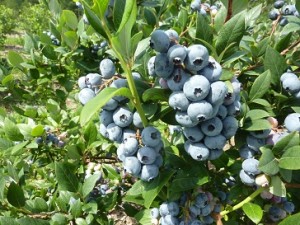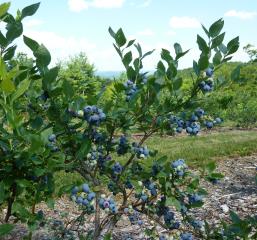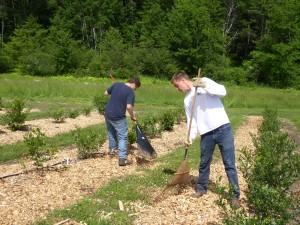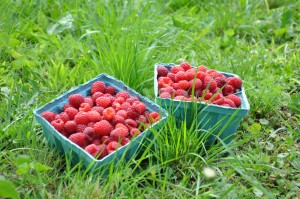Common Blueberry Questions
Q. Do I need to wash the berries?
A. No, in fact it is best NOT to wash your blueberries until you are ready to use them, because water accelerates their deterioration.

Q. How do I store my blueberries?
A. Berries can sit at room temperature for two days, and can be refrigerated for one to two weeks in a covered container, and frozen for one year.
Q. Do blueberries ripen once they are picked?
A. There is disagreement about this. It is best to pick blueberries that are fully ripe, as they are most sweet and flavorful. If you do have some that still need to ripen, place an apple in bag with your blueberries. The ethylene from the apple will cause the blueberries to ripen faster.
Q. Can I freeze blueberries?
A. Blueberries are easy to freeze –if they are dry, just seal them in a plastic freezer bag without washing and pop them in the freezer. If you prefer to wash them first, or if they are wet, pat them dry and spread them on a cookie sheet to freeze before putting them into containers. About 5 pounds fit in a one gallon freezer bag and you can use them all winter on cereal or in blueberry recipes. Keep frozen at: 0 to -10 degrees F and do not re-freeze after they thaw!
Q. What is the blue-grey haze on the surface of the berries? Is it safe to eat?
A. The coating is a safe, natural part of the fruit and not a pesticide residue. Known as the “bloom,” the waxy, silvery-white substance on the surface of grapes, blueberries, and certain plums acts as a barrier against insects and bacteria and helps to seal in the fruit’s moisture. The bloom is also a sign of freshness, since it fades with time and handling. It does not need to be washed off.
Q. What are the balloons in the berry field?
A. Birds love blueberries, and seem to know just when they are ripe. Robins, cedar waxwings, catbirds and blue jays can clean out a field in a few days. The balloons, which we move around each day, along with the hawk kite and bobble head owl, help confuse the birds and warn them to stay away. Don’t ask if it works!
Q. What about those noisy bird sounds?
A. They are electronically produced from a solar powered “Squawk box” mounted on the gazebo. They imitate the calls of predators, or injured birds, and are another way we try to protect our crops in a non-harmful way.
Q. Are your berries organic?
A. This question often refers to how plants are fertilized, as well as the use of pesticides, and the answer is complex. We use a variety of methods to promote and protect the health and safety of our plants which is called Integrated Pest Management.
We use old fashioned techniques like mulching with wood chips, weeding by hand, picking off unwanted insects and scaring the birds. Sometimes these are just not enough. We monitor our crops for the number of particular pests, and when a threshold is reached so that it is absolutely necessary to take action, we choose a method that is effective while having the least impact on the environment.
Q. What kinds of pests require sprays?
A. A particular problem in our area is an invasive fruit fly, the spotted winged drosophila. This fly arrived from Asia fewer than ten years ago, and has spread all across the US, destroying billions of dollars’ worth of soft fruits like blueberries, raspberries, cherries and peaches. Researchers all over the world are working furiously to develop safer and more effective means to control this menace, but for now, spraying is the only way to avoid a total loss of our crops. The UMass Extension Service works closely with farmers to monitor the presence of SWD so that we do not spray too early, and to keep us abreast of promising products as they emerge.
Another invasive pest, the winter moth, is now in the eastern part of the state, but has not yet arrived here. Entire crops have been lost to this insect as well.
We do use organic approved sprays as a first choice, but it is necessary to limit the use of each pesticide to ensure that pests don’t become resistant to them. At this time there are not enough different organic sprays to use them exclusively. Spraying, when necessary, is timed to allow a sufficient interval between the application of spray and the next picking time, to be confident in the safety of the berries.
As farmers, we value the quality of our crops, the safety and satisfaction of our patrons, and the responsible stewardship of the local environment all in equal measure. Our practices reflect our values for just as much for ourselves as for our patrons



